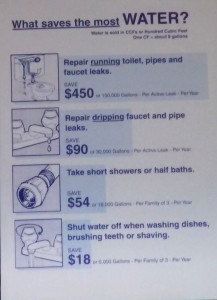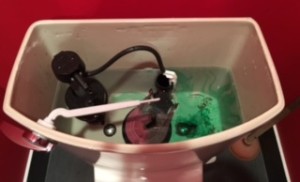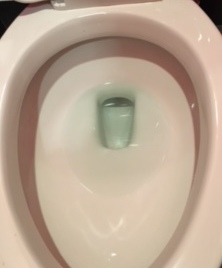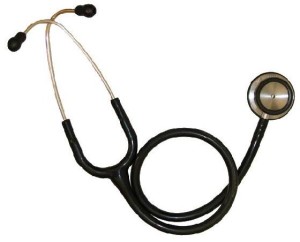I was in town hall the other day paying our real estate taxes. First I was struck by how efficient the system was – a lot of what goes on in Philly is not so efficient but the city seems to have perfected accepting money. I was also struck by the professional, informative exhibits that were displayed around the space.
system was – a lot of what goes on in Philly is not so efficient but the city seems to have perfected accepting money. I was also struck by the professional, informative exhibits that were displayed around the space.
As our readers know, I am fanatical about saving water. I thought this poster was great – easy fixes can save BIG dollars. And the estimator can be easily adapted to any water utility. Just take your water rate, multiply it by the gallons shown and you can calculate your potential savings.
So how do you check for leaks? Start big and go small, mark the leaks and make a list as you go. The easier you make the plumbers job, the faster the work gets done and the lower the service call bill:
First the toilet
Sometimes your toilet can have a sneaky leak. If you don’t have good hearing you might miss it. Try this, put 3-4 drops of food coloring in the tank (not the bowl) and then wait an hour. If any food dye shows up in the bowl, you have a leak. First try cleaning the flapper, then try adjusting the flapper, then replacing the flapper….then calling the plumber to fix it. Test for leaks with each adjustment.

Then check out your faucets, hose bibs, and shower heads
Take a look. See any drips? See water around the connections? You have a leak. Installing washers and tightening fittings is pretty simple but if you are unsure, call the plumber. I wait until I have identified all of the problems and then have the plumber come once. No sense spending all the water savings on plumber bills!
Then check your appliance connections
The washer, the dishwasher, the ice maker, the water faucet in the fridge door, the hot water heater, the humidifier on the furnace….they are all connected to your water service and they all have lots of connection points. Look at them, feel them with your finger or wipe with a tissue. Feel wet? You have a leak.
Then the pipes
Your pipes are a bit trickier because the leaks may be hidden in walls, in floors, in that cabinet you never go in…. trickier and checking them takes time. First check the magnitude of the problem. Next time you plan to leave for the day, go down and read the water meter. Take a pic or write down the amount. When you get home go read the meter again. Assuming that your faucets don’t leak and the toilets aren’t running, if the number is different from the morning, you have a leak. The bigger the number, the bigger the leak or the bigger the number of leaks.
How you approach being a leak sleuth is highly individual. Check out methods on-line, ask your friends and family, talk to your plumber….and find a method that you like best. Personally, I start by wandering around looking at walls and ceilings that I know have pipes running behind and/or above them looking for shadows in the paint that indicate wetness.
Then I go to the dread – under the sink – cabinets. These usually need to be cleaned out anyway so it is like spring cleaning and leak sleuthing in one. Look for staining, wetness, musty smells. If you find a suspect location, mark it with masking tape and write it down so you can find it again.
 Then I start listening…sort of like Harry Potter and the Basilisk, you need to literally listen to your pipes. If the water is off and they make noise, any noise, then you have a leak. The louder the sound, the closer you are to the leak. You could use a stethoscope or anything that conducts sound – a piece of metal pipe, a wrench or screwdriver, a metal cooking spoon. Put one end near a fitting and the other just in front of your ear. Odd but it works. Hear something? Hope not. If you do, keep track of where the sounds is loudest and let the plumber test the areas you have identified to find and fix the leak(s).
Then I start listening…sort of like Harry Potter and the Basilisk, you need to literally listen to your pipes. If the water is off and they make noise, any noise, then you have a leak. The louder the sound, the closer you are to the leak. You could use a stethoscope or anything that conducts sound – a piece of metal pipe, a wrench or screwdriver, a metal cooking spoon. Put one end near a fitting and the other just in front of your ear. Odd but it works. Hear something? Hope not. If you do, keep track of where the sounds is loudest and let the plumber test the areas you have identified to find and fix the leak(s).
Finding leaks isn’t easy but the water savings can be substantial, the reduced chance of mold in your home is compelling and losing musty smells can be like a breath of fresh air. I look forward to hearing your leak sleuthing stories.
